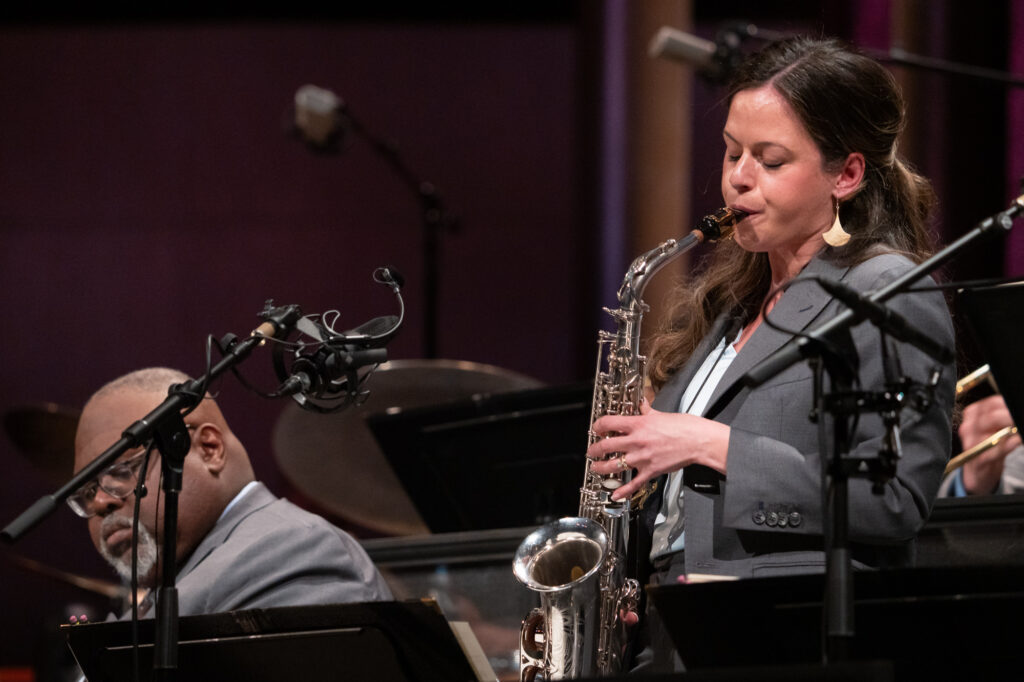Youth Movement on Display at Jazz at Lincoln Center
In the past, JALC’s presentations of newly written material have been traditionally less popular than its concerts of well-known jazz and songbook standards, but that may be changing.

The Jazz at Lincoln Center Orchestra With Wynton Marsalis
‘Contemporary Jazz Masterpieces’
Music Director: Steven Feifke
Streaming Through May 3
Prior to Friday’s concert, I must confess, the phrase “Contemporary Jazz Masterpieces” kind of put me off. Of those three words, the only one that sparks any anticipation of something fun is the one in the middle; the title as a whole led me to expect something heavy and serious.
I needn’t have worried: Jazz at Lincoln Center wasn’t about to present a program of music that isn’t swinging enough to get my foot patting. The evening was put together by pianist and composer Steven Feifke, who, at 33, is by the far the youngest-ever recipient of the Grammy Award for Big Band Jazz and is probably also the youngest to serve as musical director for a program by the JALC Orchestra with Wynton Marsalis, who served as co-host.
Then, too, newness was everywhere — there were three new faces in the rhythm section: pianist Adam Birnbaum, drummer Domo Branch, and guitarist James Zito. The reed section is now almost completely young players, with the only greybeard being the formidable Sherman Irby. He now shares the alto solos with Alexa Tarantino, who at 32 is also Mrs. Feifke.
The trombones had two newish players in Nate Jones and Marshall Gilkes, joining Elliot Mason with his familiar amish goatee. Only the trumpets section was entirely made up of Rose Hall stalwarts, with Ryan Kisor, Kenny Rampton, and Marcus Printup in their familiar chairs to the immediate stage left of Mr. Marsalis.

“Overture,” from a larger work called “The Philadelphia Suite” by Joshua Lee, opened the evening. The inspiration was clearly Duke Ellington’s many extended works, especially 1950’s “Harlem,” as well as Benny Carter’s “Kansas City Suite” for Count Basie.
“Overture” used a kind of Ducal form and structure; like nearly everything that followed, it was through-composed, not a repeating cycle of choruses based on familiar standard or blues harmonic patterns, and didn’t use any specifically Duke-ish tonal colors. Yet like Ellington and Carter, it swung like crazy, being essentially a musical depiction (at least to my ears and imagination) of Philadelphia or any big American city waking up in the morning.
Conversely, one piece played near the end of the evening, Leo Steinriede’s “Blues 25,” made a point out of being directly based on the old, reliable basic blues format, but was creative and inspired in its use of that foundation.
I might have thought that the second piece, Helen Sung’s “A Little Bird Watching,” was ornithologically driven, especially in that it opens with an innovative use of the classical technique sometimes known as hocket, which might handily depict canaries and cuckoos chirping back and forth. But it turns out that the piece was inspired by her mentor, a diminutive giant of jazz composition, Jimmy Heath, nicknamed Little Bird for his early allegiance to Charlie Parker.
“Charles,” a dedication by composer George DeLancey to his year-old son, began with cool sonorities that suggest the main title theme from a very hip late 1960s cop show, and gave us a blues-driven trombone solo by Mr. Gilkes and a high-energy trumpet chorus by Mr. Marsallis. Jihye Lee’s “Revived Mind” evidenced a distinctly Asian sensibility that made prominent use of flutes; it could have been a Korean composer’s direct response to Elington’s “Far East Suite.”
The second act was highlighted by a stunning ballad, “Radiant Flower (Zara)” by Xavier Nero, which was a feature for the big-toned tenor saxophone of Abdias Armenteros — warm and romantic in the tradition of Ben Webster. Darcy James Argue supplied “Single Cell Jitterbug,” but to parse the title it was more about dancing than elementary biology, being a catchy and swinging piece.
The host also offered two selections, the biblically-based “Ali Dell’Angelo” in the first act, with a resounding solo by Ms. Tarantino, as well as the evening’s climactic piece, “The Same River,” at the end of the second half. It had a kind of Gospel feel in a distinct 3/4 — marked by hand claps at several points — with Mr. Irby preaching on his alto saxophone. The piece ingeniously whirled and twirled in distinct patterns, never quite repeating itself.
Two other points: In the past, JALC’s presentations of newly written material have been traditionally less popular than its concerts of well-known jazz and songbook standards, but Friday night’s show was packed if not completely sold out. Also, clearly without intending to, the lineup of works presented what amounted to a completely organic demonstration of the virtues of diversity: there were African American, Caucasian, Asian, and Latinx composers, as well as a commendable portion of female writers.
Most of all, there was a significant concentration of that most elusive quality in 21st century jazz, namely youth. When Mr. Steinreider, composer of “Blues ’25,” stood up to take a bow at the end of the evening, we all realized that the title refers if not to his age then probably to the year in which he graduates from the Manhattan School of Music.

